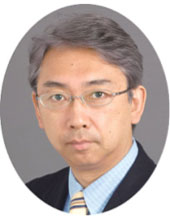Distinguished Educational Practitioners Award
Pioneering efforts in graduate school education that integrates humanities and sciences to develop new types of doctoral human resources

Dr. Fumihiko Kannari completed the doctoral program at the Graduate School of Engineering, Keio University in 1985. After working at Rutherford Appleton Laboratory in the United Kingdom and Spectra Technology, Inc. in the United States, he was hired by the Department of Electrical and Engineering, Faculty of Science and Technology at Keio University in 1988, and is currently active as a professor at the Department of Electrical and Information Engineering.
Although Japan is a developed country with issues such as a declining birthrate and an aging population, it has a serious problem that the number of doctoral personnel who will lead the future is declining. He thought that it was necessary to develop not only highly specialized doctoral human resources who aim to become researchers and university professors, but also leading human resources who can play an active role globally across industry, government, and academia, with a bird's-eye view and the creativity to tackle complex and difficult issues in a diversified and sophisticated society. Based on more than 30 years of graduate school education and research experience, Prof. Kannari aimed to develop highly-skilled doctoral human resources as a culmination of this, and has built a full-scale, humanities and sciences integrated education program unique to Keio, and has been playing a central role in promoting the production of a new type of leading human resources. So far, more than 20 excellent doctoral degree holders have been produced, and they have advanced to positions at central government offices, trading companies, new business planners of large companies, etc. He launched this program in 2011, led the planning and operation of pioneering programs as a leader from 2014 to today, and put it on track as an industry-government-academia collaborative education system.
The doctoral human resources education promoted by him is (1) to obtain two master's degrees (Dual-degree system) and one doctoral degree in humanities and sciences in five years to realize the true fusion of humanities and sciences, and (2) to hold seminars / project activities dispatching mentors from companies to cultivate social communication skills for producing policy proposals, and (3) international internships at companies / NPOs to develop internationality.
In this way, he has greatly contributed to the production of highly-skilled science and engineering personnel and the diversification of career paths by completing the humanities and sciences integrated education program concretely and practically in order to renew advanced human resources education at a conventional science and engineering graduate school.
Based on this experience, he has also contributed to discussions on graduate school education reform as a member of the graduate school subcommittee of the Central Education Council. I think that his achievements are suitable for the Society's Educational Excellence Award, which is one of the largest academic societies in Japan for science and engineering.